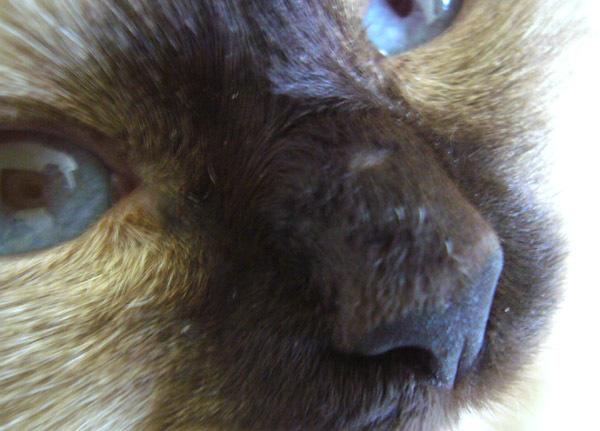QuestionOur oldest cat (16 yrs.) had to be put down last week -- it was the right thing to do because he was suffering. We have another cat, who is 8 (a female). She is already missing him obviously. We want another cat but don't know whether to get a kitten or young adult. In no way do we want to upset our existing cat any further, but we think she would like a companion. Any suggestions re getting an adult vs. a kitten, and how to introduce the two. We want to get one as soon as possible. Thank you.
AnswerRosann,
I am terribly sorry that you have recently lost a member of your family. You may find that a piece of writing by Paul C. Dahm called The Rainbow Bridge comforting during this time. It is completely natural for your younger cat to mourn, but be sure to keep a close eye on her to prevent her from becoming ill or depressed. Since you have a middle aged cat I would recommend that you consider integrating a kitten rather than an older cat because kittens normally integrate into a household with other cats much better than an adult cat. There is no magical right answer as to when the time is right to offer a new cat a home after the death of a much loved cat. I wouldn't recommend that you go looking for a cat to replace the one that you have lost simply because no other cat will live up to the memory of the special cat that you have lost. If it's at all possible to try and get a cat that looks nothing like the special one that you have lost because this will make things easier for your older cat and your family as a whole.
It is important to make sure that you don't just come home with a kitten and plop it onto the floor the minute that you walk into the door. New cats/kittens must be separated for a minimum of 2-3 weeks. There are two reasons for this isolation. Firstly it allows the new member of the family to get used to the established cat in the home and vice versa. The other advantage to isolating your new cat is to quarantine him so that any viral/bacterial infections not be allowed to spread. The isolation period also allows you to have time to have the new family member assessed by your vet and begin routine health care such as deworming and vaccines. It is also a good idea to use a hand towel to rub all over the new kitten's body, then all over the resident cat's body and then over the kitten again. This allows your cat and new kitten to smell their scents mixed together a couple of times each day which increases the likelihood that the first meeting goes well. Feeding the cat and new family member on either side of the closed door that the kitten is in helps to get the cats to become familiar with each other. If you are able to play with the cats under the door then it's certainly a good idea. You could use a shoelace to entice the cats to play with each other underneath the door, but be aware the string, yarn, thread, shoelaces, etc are not a toy to be played with if nobody is supervising the cats because they can swallow these items and potentially cause serious harm within the digestive system and potentially cutting through the bowels which can be life threatening. It is normal for some cats to be a bit out of sorts when a new cat/kitten comes into their home. It isn't uncommon even after the gradual introduction to see a bit of hissing and the odd swipe with the paw. This is normal behavior and it will help to establish where the new kitten fits into the household. If things suddenly change and fur is flying and there is a real fight that could potentially hurt one of the cats then I would recommend that you use a glass of water to douse the conflict and dampen the tempers. Never put any part of your body in between cats that are fighting as cats can sometimes cause serious accidental injuries with claws and teeth that require medical attention. It is also important that you not give the new kitty attention that takes away from the attention that your resident cat is used to receiving. If the cats are having a discussion and the odd hiss, swat or growl comes into the mix don't run over and rescue the kitten as this can potentially lead to the older cat simply becoming smarter about the way that discipline is handed out and then you may not see the results of these situations. If things are getting out of hand then it is quite important to use water or a broom to gently guide the cats away from each other and into another room to cool off...Let the situation sort itself out so long as nobody gets hurt. I would highly recommend that you make adoption your first option to find your new family member. By adopting a cat or kitten from a shelter you will save a life. There are thousands of cats to choose from that are living in shelters for any number of reasons ranging from being seized by the SPCA or Humane Society due to cruelty, abandonment or other issues and by adopting from your local shelter you are giving a cat/kitten a secure future as well as providing money to care for other animals that may be admitted to the shelter for a variety of reasons.
I would highly recommend that you ask your vet about cycling vaccines to provide your new family member with the best possible start in life as possible. Your new kitten should receive all of his/her vaccines and then cycling vaccines becomes a possibility. Cycling vaccines is fairly new, studies in veterinary medicine found that we may be killing our pets with kindness by over vaccinating them. According to the recent research over vaccinating a pet can actually create an over reactive immune response that can contribute to kidney failure or other health problems. You have the option of requesting that your vet take a blood sample to test the level of immunity in your cat's blood against illnesses that are routinely vaccinated against. The disadvantage of this test is that it is quite expensive, but it is quite accurate so if you aren't on a fixed budget you can have your vet check your cat's immune system's response to infections that vaccines protect against. If your cat's immunities aren't strong enough then you can request that your vet cycles the vaccines which would mean that your cat may not receive vaccines at the routine check up every year. I hope that you have found this information helpful. If you have any further questions or concerns, or you would simply like to send an update or some pictures my way, please don't hesitate to contact me again.

 Throwing Up and Pooping
Question
Pepper
Hi,
Well my cat is 12 years old and la
Throwing Up and Pooping
Question
Pepper
Hi,
Well my cat is 12 years old and la
 Treating cat dominance/aggression with prozac
QuestionI adopted a 3-year old male from the shelter th
Treating cat dominance/aggression with prozac
QuestionI adopted a 3-year old male from the shelter th
 Bald spot on my cats nose
Question
bald spot
Hello Jessica,
Today I notic
Bald spot on my cats nose
Question
bald spot
Hello Jessica,
Today I notic
 my first kitten
QuestionQUESTION: hi im just wondering if u know what k
my first kitten
QuestionQUESTION: hi im just wondering if u know what k
 how long do I need to bottle feed?
Question
3 weeks old with their
4 weeks ago I was ridin
how long do I need to bottle feed?
Question
3 weeks old with their
4 weeks ago I was ridin